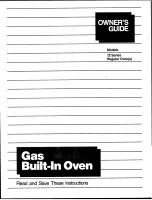
13
TROUBLESHOOTING
TEMPERATURE
Temperature too high.
1/ Controller set too high-see section 6.3
2/ Controller failed on – call Customer Service.
3/ Wiring error – call Customer Service.
Display reads “HI” or “400”+.
Probe is unplugged, is broken or wire to sensor is broken –
trace wire from display to probe; move wire and watch
display to see intermittent problems
Chamber temp spikes over set
point and then settles to set point.
Recalibrate – see section 6.4.
Temperature too low
1/ High limit set too low – see section 6.5.
2/ Controller set too low – see section 6.3.
3/ Unit not recovered from door opening – wait for display
to stop changing.
4/ Unit not recovered from power failure or being turned off
– ovens will need several hours to warm up and stabilize.
5/ Element failure – compare current draw to data plate.
6/ Controller failure – call Customer Service.
7/ High limit failure – confirm with front panel lights that
Safety Thermostat is operating correctly.
8/ Wiring problem – check all functions and compare wiring
to schematic in section 9.0 – especially around any areas
recently worked on.
9/ Loose connection – check control panel for loose
connections.
Display reads “LO”
1/ Bad probe or disconnected – call Customer Service.
2/ If ambient temperature is lower than range of unit –
compare set points and ambient temperature to rated
specifications in section 9.0.
Unit will not heat over a
temperature that is below set
point
1/ On F suffix models confirm that fan is moving and that
amperage and voltage match data plate – check for air
movement in chamber.
2/ Confirm that set point is set high enough –turn Safety
Thermostat all the way clockwise and see if OTP light
comes on.
Section
8











































